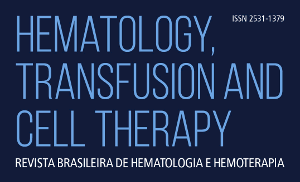Dear Editor,
We read the publication on "Risk of Zika virus transmission by blood donations in Brazil" with a great interest.11 Magnus MM, Espósito DL, Costa VA, Melo PS, Costa-Lima C, Fonseca BA, et al. Risk of Zika virus transmission by blood donations in Brazil. Hematol Transfus Cell Ther. 2018;40(3):250-4. Magnus et al. concluded that "the risk for Zika virus transmission by blood transfusion is real, even in regions with a low circulation of the disease, but the combination of the detection of Zika virus RNA by polymerase chain reaction and post-donation surveillance might reduce the risk of transmission by blood transfusions11 Magnus MM, Espósito DL, Costa VA, Melo PS, Costa-Lima C, Fonseca BA, et al. Risk of Zika virus transmission by blood donations in Brazil. Hematol Transfus Cell Ther. 2018;40(3):250-4.." We would like to share ideas and experience on the observation in this study. In our area in Indochina where asymptomatic Zika virus infection is common,22 San K, Rajadhan V. Seroprevalence of Zika virus in Cambodia: a preliminary report. Adv Lab Med Int. 2016;6:37-40.,33 Wiwanitkit S, Wiwanitkit V. Afebrile, asymptomatic and non-thrombocytopenic Zika virus infection: don't miss it!. Asian Pac J Trop Med. 2016;9(5):513. the risk of transmission is possible and estimated at 0.38%.44 Wiwanitkit S, Wiwanitkit V. Based on the risk of dengue virus transmission via blood transfusion: what about the risk in case of Zika virus?. Asian Pac J Trop Med. 2016;9(11):1123-4. The rate is similar to the observed virus contamination rate reported by Magnus et al.11 Magnus MM, Espósito DL, Costa VA, Melo PS, Costa-Lima C, Fonseca BA, et al. Risk of Zika virus transmission by blood donations in Brazil. Hematol Transfus Cell Ther. 2018;40(3):250-4. Hence, it is no doubt that there is a considerable rate of Zika virus contamination worldwide. The screening can be useful and the topic on cost effectiveness has to be further studied and discussed. Nevertheless, the conclusion that post-donation surveillance can reduce risk might not be valid. The post-donation surveillance can give only epidemiological data that might be useful for public health planning, but it cannot determine the exact cross-sectional situation at donation.
References
-
1Magnus MM, Espósito DL, Costa VA, Melo PS, Costa-Lima C, Fonseca BA, et al. Risk of Zika virus transmission by blood donations in Brazil. Hematol Transfus Cell Ther. 2018;40(3):250-4.
-
2San K, Rajadhan V. Seroprevalence of Zika virus in Cambodia: a preliminary report. Adv Lab Med Int. 2016;6:37-40.
-
3Wiwanitkit S, Wiwanitkit V. Afebrile, asymptomatic and non-thrombocytopenic Zika virus infection: don't miss it!. Asian Pac J Trop Med. 2016;9(5):513.
-
4Wiwanitkit S, Wiwanitkit V. Based on the risk of dengue virus transmission via blood transfusion: what about the risk in case of Zika virus?. Asian Pac J Trop Med. 2016;9(11):1123-4.
Publication Dates
-
Publication in this collection
10 Oct 2019 -
Date of issue
Jul-Sep 2019
History
-
Received
26 Aug 2018 -
Accepted
12 Nov 2018 -
Published
19 Feb 2019

